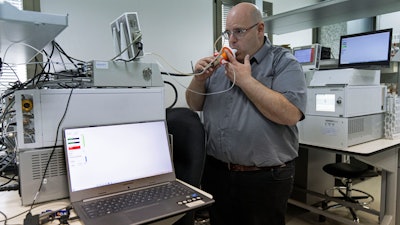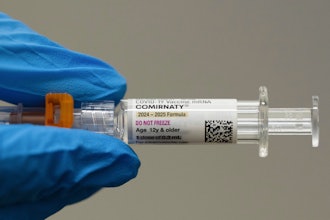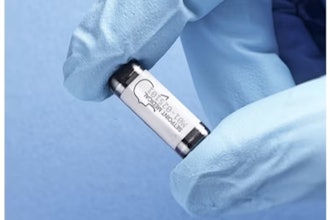
REHOVOT, Israel (AP) — When he was 20 years old, Harel Hershtik planned and executed a murder, shooting his victim in the head and burying the body in a crime that a quarter of a century later is still widely remembered for its grisly details.
Today, he is the brains behind an Israeli health-tech startup, poised to make millions of dollars with the backing of prominent public figures and deep-pocket investors.
Neither his conviction for premeditated murder, his lengthy prison sentence nor his parole board-mandated nightly house arrest have obstructed his rise. His partners tout him as a successful case of rehabilitation and second chances.
But with his company set to go public, Hershtik’s past is coming under new scrutiny, raising questions about whether someone who took a person’s life deserves to rehabilitate his own to such an extent. It also tells an astounding tale of a life derailed and improbably set back on track through a combination of intellect, drive and guile.
“When I was young, I would say that I was stupid and arrogant,” said Hershtik, now 46, sitting in his office beside a futuristic-looking computer with colorful cooling mechanisms he built on his own. “You can be a genius and yet still be very stupid and the two don’t contradict each other.”
Today, Hershtik is the vice president of strategy and technology at Scentech Medical, a company he founded in 2018 while behind bars and which says its product can detect certain diseases through a breath test.
In a three-hour interview with The Associated Press, his first with an international news outlet, he repeatedly expressed remorse for his crime.
 Harel Hershtik works at his lab in Rehovot, Israel, Wednesday, May 11, 2022. When he was 20 years old, Hershtik planned and executed a murder. Today, he is the brains behind an Israeli health-tech startup, poised to make millions of dollars with the backing of prominent public figures and deep-pocketed investors.AP Photo/Ariel Schalit
Harel Hershtik works at his lab in Rehovot, Israel, Wednesday, May 11, 2022. When he was 20 years old, Hershtik planned and executed a murder. Today, he is the brains behind an Israeli health-tech startup, poised to make millions of dollars with the backing of prominent public figures and deep-pocketed investors.AP Photo/Ariel Schalit
At 14, Hershtik met Yaakov Sela, a charismatic snake trapper with a coterie of young fans who gravitated toward his warm personality and kooky profession. Hershtik, who said he was physically and emotionally abused over his weight by peers at a kibbutz where he was raised, loved snakes and met Sela at a zootherapy program.
Hershtik learned from Sela about the world of snake handling and the two set up snake exhibits together and partnered to crossbreed the reptiles. But despite their initial connection, the relationship morphed from a mentorship to one of “mutual hate and loathing,” according to court documents.
Sela was known for having numerous girlfriends at once, including Hershtik’s mother. Hershtik told the AP he felt uneasy with the way Sela treated some of those women and had “a problem seeing him talking to women in demeaning ways, especially toward someone that I cared about and loved.”
Tovia Bat-Leah was among Sela's admirers. She met him at a kibbutz in the late 80s and six months later was pregnant with his child. She called him a brilliant and warmhearted but troubled man who was traumatized by his upbringing by adoptive parents who were Holocaust survivors. She said Sela was always loving but could be unreliable.
“When you were with him, you were the only person who existed on the face of the earth and he was fully focused on you. And when you weren’t there, you didn’t exist,” she said.
In early 1996, Sela discovered that Hershtik had stolen 49,000 shekels (about $15,000 at the time) from him, and the two agreed that instead of involving the police, Hershtik would pay him back double that amount. Court documents say Hershtik concocted a plan to drive Sela to banks around the country, duping him into thinking he was gathering up the money to pay him back.
During the drive, Hershtik pretended he needed to throw up and Sela stopped the car. Once he pulled over, Hershtik’s accomplice fired three shots at Sela, using Hershtik’s mother’s pistol. He then handed Hershtik the gun, according to the documents, and Hershtik shot Sela in the head at close range.
The pair shoved Sela’s body into the trunk and buried it in a grove in the Golan Heights, according to the documents. Weeks later, hikers saw a hand poking up from the earth, and Sela’s body was found.
The sensational crime gripped the nation. Sela’s disappearance, murder and the trial — and the Shakespearean details of deceit, lust and tragedy that emerged from it — repeatedly splashed across newspaper front pages.
In court documents, prosecutors say Hershtik schemed and lied in his attempt to distance himself from the killing. Even his own mother, also convicted in the incident, called him a “pathological liar,” according to the court documents. Prosecutors said he lied repeatedly about his whereabouts the day Sela disappeared and claimed that Sela fled the country following a hit-and-run incident.
“I am telling you unequivocally that we didn’t use violent means as a solution to problems. I am a person who uses pens and pencils and computers to solve problems,” he told an interviewer at the time, according to the court documents, as police were working to crack the case.
Today, Hershtik said he was compelled to lie so that he could protect the others involved in the scheme, which included a friend eventually found to be mentally unstable as well as his mother. His mother was convicted of several crimes, including for having tried to thwart a police complaint by Sela's mother about his disappearance.
After Hershtik’s accomplice confessed to police, Hershtik was sentenced to life in prison for premeditated murder and obstructing justice, among other crimes.
In a sense, Hershtik flourished during his prison time. He earned two doctorates, in math and chemistry, and he got married three separate times. He said he established 31 companies, selling six of them.
Aside from the physical limits of life behind bars, Israeli law doesn’t bar prisoners from doing business, although Hershtik’s success is rare.
“You are limited by reality. You’re in jail,” Hershtik said. “You’re running a company. You can’t run it from jail yourself. You have to rely on other people to go talk, do contracts, deals.”
To circumvent that hurdle, Hershtik installed CEOs to run the day-to-day activities of his companies. He used whatever infrastructure was available to him in prison, being granted a computer in his cell at one point. With limited access to the internet, Hershtik said he had to get lengthy documents read to him over the phone.
His first company, which he launched in 1998, focused on video compression technology. He enlisted a tech columnist as CEO of the company, which was eventually sold, netting Hershtik an undisclosed amount.
Hershtik met his first wife through regular interpersonal contact while he was in remand. He met his second wife after he put a call out in a widely-read women’s magazine while he met the third in an online chat room, sparking a relationship that lasted 14 years. He is now divorced, with no children.
He said he hobnobbed with some of Israel's most famous prisoners while behind bars, including former Prime Minister Ehud Olmert and former President Moshe Katsav.
But prison was also a fraught time for Hershtik. He said he spent 11 years in quarantine because of health issues that led to a serious deterioration of his immune system. Contact with other inmates could imperil his condition. He was punished twice for setting up internet access to his cell, in one case building a modem out of two dismantled DVD players. He said he spent weeks in solitary confinement — in a “dungeon” as Hershtik describes it — for his violation.
He also said he was stabbed by two Arab inmates after being caught up in a plot to catapult a severed pig’s head with a Quran in its mouth into Jerusalem’s Al-Aqsa Mosque. Hershtik said he suggested the plot to two Jewish nationalists he met in prison, but said he was being hypothetical.
When the country’s domestic security agency Shin Bet caught wind of the plan, it enlisted Hershtik as an informant, he said. When the Arab inmates heard Hershtik assisted the Shin Bet, they stabbed him, Hershtik said.
Court documents related to the case say Hershtik “proved himself to be a very problematic witness and source of information,” saying he repeatedly changed his story regarding his involvement.
Last year, a parole board determined Hershtik had been rehabilitated and no longer posed a danger to society.
“Throughout the treatment, the inmate presented as a person with especially high intelligence, with no judgment or comprehension disorders,” the parole board wrote.
As part of his early release and until 2026, he is under nightly house arrest from 11 p.m. to 6 a.m. He must wear a tracking device around his ankle at all times and he is barred from leaving the country.
 Harel Hershtik has his electronic monitoring device for convicted and released prisoners on his left leg as he works in his labs in Rehovot, central Israel, Wednesday, May 11, 2022. When he was 20 years old, Hershtik planned and executed a murder. Today, he is the brains behind an Israeli health-tech startup, poised to make millions of dollars with the backing of prominent public figures and deep-pocketed investors.AP Photo/Ariel Schalit
Harel Hershtik has his electronic monitoring device for convicted and released prisoners on his left leg as he works in his labs in Rehovot, central Israel, Wednesday, May 11, 2022. When he was 20 years old, Hershtik planned and executed a murder. Today, he is the brains behind an Israeli health-tech startup, poised to make millions of dollars with the backing of prominent public figures and deep-pocketed investors.AP Photo/Ariel Schalit
A free man, Hershtik sat recently with the AP in his office in the central city of Rehovot, Israel. An electric toothbrush and an energy drink perched on his desk next to a long, curved computer screen. He wore a grey shirt with just a hint of wrinkles, but had two spare ironed shirts delivered just in case he had to make himself more presentable. He did not change during the interview.
He owns an Audi and without a driver's license, he is ferried around by two rotating drivers.
His start-up is waiting for regulatory approval to merge with a company called NextGen Biomed, which trades on the Tel Aviv Stock Exchange and would make Scentech public. Talks that brought about the merger also took place while Hershtik was in prison.
Hershtik said the company's product is being finalized for detecting COVID-19 through a patient's breath, and it is working to add other diseases such as certain cancers as well as depression. The product is meant to provide on-the-spot results in a non-invasive way.
The company has received a patent for its technology in Israel and said it is preparing to apply for FDA approval soon. Disease diagnosis by breath is a growing field and other companies say they do similar things, but Hershtik said his patented technology allows for unique chemical indicators in the breath to be identified and used to diagnose diseases.
Hershtik said he looks at his potentially life-saving invention as a way to give back to society.
“The remorse that I felt for what I did would become a beacon for my path forward,” Hershtik said. “This company was built because I wanted to do something better, to leave the world a better place.”
Hershtik said the merger values the company at around $250 million and that he has raised more than $25 million in funding over the last two years through private Israeli investors. A large part of the investment is from Hershtik’s own money, although he won’t say how much.
The company is backed by prominent Israeli names. Yaakov Amidror, who chairs NextGen, is a former chief of the country’s National Security Council. Zeev Rotstein, who leads the company’s scientific council, used to head one of the country’s largest hospitals. And Shmuel Shapira, the company’s chief technology officer, is the former director of the Israel Institute for Biological Research, a state-run scientific research body.
“According to the rules of the country, the man is allowed to rehabilitate. He paid his price and he rehabilitated. So there is no reason not to help him rehabilitate,” Amidror, who testified to the parole board on Hershtik’s behalf, told the AP.
But his past is already haunting him. Hershtik was demoted from CTO earlier this year to his current position, in part because he didn’t want his crime to scare away investors once the company goes public. In the About Us section of the company’s website, Hershtik is last on the list of team members even though Scentech is his brainchild. His bio does not mention the murder.
Drew Morris, a board member and investor, admits he was “freaked out” when he first heard of Hershtik’s story. But today, he believes his partner is trying to “do something good for the world.”
“Harel has always said if for some reason his presence is a problem and the company would be better off without him, that he’s willing to leave the company,” Morris added.
And as the company seeks to take its product to market, investors will need to decide whether Hershtik’s rap sheet influences where they put their money.
Ishak Saporta, a senior lecturer at Tel Aviv University’s Coller School of Management, said he believed investors would be drawn to the company’s potential for profit rather than deterred by Hershtik’s history.
“What concerns me here is that he became a millionaire. He paid his debt to society in jail. But does he have a commitment to the victim’s family,” Saporta said.
Bat-Leah, the mother of Sela’s child, remains traumatized. While she was no longer in a romantic relationship with Sela when he was killed, his death was a painful loss that came on the heels of the killing of her brother in 1991 by the notorious serial killer Jeffrey Dahmer.
She believes Hershtik should do something for the family. While Saporta proposed that Hershtik give Sela’s survivors company stock, Bat-Leah suggested he help fund her daughter’s education or create a reptile museum in Sela’s name.
“He served his time but he should also make some kind of reparation,” she said. “Whatever that looks like I don’t know.”
Hershtik sees the good that could come about from the company as the ultimate form of repentance. He said he could have used his smarts to create any sort of company with no benefit to society but chose health-tech instead.
“Trust me, this is not for the money,” he said.
 Harel Hershtik pose for a photograph at his labs in Rehovot, Israel, Wednesday, May 11, 2022. When he was 20 years old, Hershtik planned and executed a murder. Today, he is the brains behind an Israeli health-tech startup, poised to make millions of dollars with the backing of prominent public figures and deep-pocketed investors.AP Photo/Ariel Schalit
Harel Hershtik pose for a photograph at his labs in Rehovot, Israel, Wednesday, May 11, 2022. When he was 20 years old, Hershtik planned and executed a murder. Today, he is the brains behind an Israeli health-tech startup, poised to make millions of dollars with the backing of prominent public figures and deep-pocketed investors.AP Photo/Ariel Schalit






















